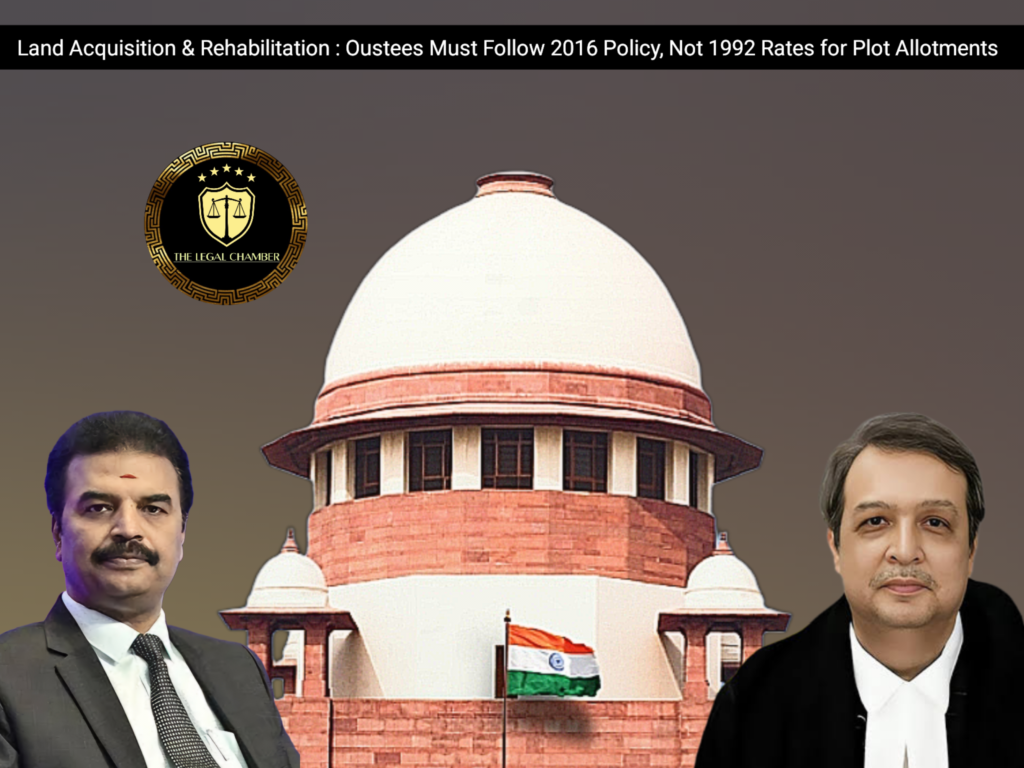
The Supreme Court held that oustees (landowners whose land was acquired) cannot claim plots under HUDA’s 1992 policy rates but must comply with the revised 2016 policy. The Court clarified that suits under Section 39 of the Specific Relief Act for mandatory injunction require a proven legal obligation, which was absent here due to non-compliance with application formalities. It emphasized that rehabilitation schemes are discretionary, not a statutory right, and upheld the State’s authority to modify policies prospectively. The judgment also reinforced that Article 21 (right to livelihood) does not mandate plot allotments in land acquisition cases.
Facts Of The Case:
The case involved a dispute between the Haryana Urban Development Authority (HUDA) and landowners (oustees) whose land was acquired in 1992 for residential sectors in Kaithal. HUDA had introduced a 1992 policy offering preferential allotment of plots to oustees at fixed rates. However, many oustees did not apply formally or deposit the required 10% earnest money as per the policy. Decades later, they filed civil suits under Section 39 of the Specific Relief Act, 1963, seeking mandatory injunctions to enforce the 1992 policy rates. The trial courts gave mixed rulings—some dismissed the suits for delay and non-compliance, while others decreed in favor of the oustees. The Punjab & Haryana High Court upheld the decrees, relying on precedents like Brij Mohan v. HUDA (2011).HUDA appealed to the Supreme Court, arguing that the suits were time-barred, non-compliant with policy terms, and that the 2016 policy (revised rates) should apply. The Court noted that the oustees had not fulfilled procedural requirements under the 1992 scheme and delayed litigation by 14-20 years. It also clarified that rehabilitation policies are not a legal right under land acquisition laws. Ultimately, the Court ruled that oustees must seek plots under the 2016 policy, subject to fresh applications, but barred retrospective claims under the old rates.
Procedural History:
The case originated when oustees (landowners whose land was acquired) filed civil suits in 2006-2007 under Section 39 of the Specific Relief Act, 1963, seeking mandatory injunctions to compel HUDA to allot plots under the 1992 policy rates. The trial courts delivered split verdicts—some dismissed the suits for limitation, non-compliance with procedural formalities (like depositing earnest money), and lack of maintainability, while others decreed in favor of the oustees. On appeal, the First Appellate Courts modified some rulings, often favoring the oustees.The matter reached the Punjab & Haryana High Court in Second Appeals (2016-2019), where the High Court upheld the decrees in favor of the oustees, relying on precedents like Brij Mohan v. HUDA (2011) and Jarnail Singh v. State of Punjab (2010). HUDA then filed Special Leave Petitions (SLPs) before the Supreme Court, which issued a notice in 2017 but stayed execution pending final adjudication. After extensive hearings, the Supreme Court delivered its judgment in July 2025, reversing the High Court’s decision and ruling that the oustees must seek benefits under the 2016 policy, subject to fresh applications, while clarifying key legal principles on mandatory injunctions, limitation, and rehabilitation rights.
READ ALSO : Forced Marriage to Murder: The Shocking Case of Kum. Shubha & the Tragic Crime
Court Observation:
The Supreme Court made several critical observations in its judgment. It emphasized that mandatory injunctions under Section 39 of the Specific Relief Act, 1963 can only be granted when there is a clear legal obligation and the plaintiff has fulfilled all necessary conditions—which the oustees failed to do by not submitting proper applications or depositing earnest money under the 1992 policy. The Court noted that rehabilitation policies are discretionary welfare measures, not enforceable legal rights, and the State retains the authority to modify such schemes prospectively.The Bench rejected the argument that oustees had a vested right to 1992 rates, clarifying that Article 21 (right to livelihood) does not mandate plot allotments in land acquisition cases. It underscored that limitation laws (Article 113 of the Limitation Act) barred the suits, as oustees approached courts after 14–20 years of alleged cause of action. The judgment also cautioned against mechanical application of precedents like Brij Mohan, distinguishing it on facts since the claimants there had duly applied under the policy. Ultimately, the Court prioritized policy consistency and fiscal practicality, directing allotments under the 2016 scheme while safeguarding against misuse by non-genuine claimants.
Final Decision & Judgement:
In its final judgment, the Supreme Court set aside the High Court’s rulings and held that the oustees were not entitled to claim plots under the 1992 policy rates, as they had failed to comply with mandatory procedural requirements, including submitting formal applications and depositing earnest money. The Court ruled that the 2016 policy, with its revised rates and conditions, would govern future allotments, emphasizing that rehabilitation schemes are discretionary and not an enforceable legal right. The Bench granted oustees a one-time opportunity to apply for plots under the 2016 policy within four weeks, subject to eligibility verification, but barred retrospective claims under the old rates. It imposed restrictions on resale (minimum five years) to prevent speculative gains and directed HUDA to complete the allotment process within eight weeks of receiving applications. The judgment reinforced that Article 21 does not guarantee plot allotments in land acquisition cases and dismissed the suits as time-barred under limitation laws. The decision balanced humanitarian concerns with administrative practicality, ensuring policy consistency while curbing litigation abuse.
Case Details:
Case Title:Estate Officer, Haryana Urban Development Authority & Ors. vs. Nirmala Devi & Ors. Citation:(2025) INSC 843 Appeal No:Civil Appeal Nos. 7707-7735 of 2025 Date of Judgment: 14th July 2025 Bench: Justice J.B. Pardiwala & Justice R. Mahadevan
Download The Judgement Here